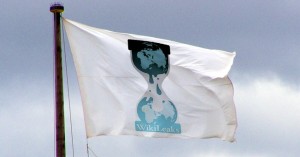WikiLeaks Defies Australian Court’s ‘Blanket Censorship Order’ by Publishing It
ASIA--PACIFIC, 4 Aug 2014
Founder Julian Assange says unprecedented government gag order is ‘blindfolding the Australian public’.
WikiLeaks has revealed a secret court order in Australia to censor reporting on a massive, years-long political bribery and corruption scandal in the country involving its central bank and several international leaders. Described as a “superinjunction,” the order blocks reporting on the order itself, as well as the content of the investigation, in a case of censorship that WikiLeaks founder Julian Assange called “the worst in living memory.”
Calling it “the largest high-level corruption case in Australia and the region,” the media outlet on Wednesday published an order by the Supreme Court of Victoria in Melbourne that blocks news agencies from reporting on a multi-million dollar bribery investigation into subsidiaries of the Reserve Bank of Australia (RBA) and government officials in Indonesia, Malaysia, and Vietnam. Even now, Australian media is prevented from publishing the documents or its contents.
“[The] Australian government is not just gagging the Australian press, it is blindfolding the Australian public,” Assange, who is Australian, said after the release of the documents. “This is not simply a question of the Australian government failing to give this international corruption case the public scrutiny it is due. Foreign Minister Julie Bishop must explain why she is threatening every Australian with imprisonment in an attempt to cover up an embarrassing corruption scandal involving the Australian government.”
The court claimed that secrecy is necessary to prevent damage to Australia’s relations with other countries and preserve the reputations of the high-ranking international officials. It also claimed that publicizing the case may put “national security” at risk, a familiar argument from many governments fighting to hide evidence of their misdeeds.
RBA subsidiaries Securency and Note Printing Australia are accused of paying off high-ranking officials from 1999 to 2004 to secure the supply of Australian-style polymer bank notes to the governments of Malaysia, Indonesia, Vietnam and other countries.
The gag order stated that the blanket censorship was “to prevent damage to Australia’s international relations that may be caused by the publication of material that may damage the reputations of specified individuals who are not the subject of charges in these proceedings.”
Assange responded to the court’s justification of censorship by stating:
“The concept of ‘national security’ is not meant to serve as a blanket phrase to cover up serious corruption allegations involving government officials, in Australia or elsewhere. It is in the public interest for the press to be able to report on this case, which concerns the subsidiaries of the Australian central bank. Who is brokering our deals, and how are we brokering them as a nation? Corruption investigations and secret gag orders for ‘national security’ reasons are strange bedfellows.”
The order was issued on June 19 after the secret indictment of several senior executives from Securency and Note Printing Australia. The investigation also explicitly named more than a dozen current and former heads of state from those countries, as well as their relatives and other high-ranking officials, who may have “received or attempted to receive a bribe” or been “willfully blind” to their colleagues receiving payoffs.
WikiLeaks said the last blanket order of this magnitude was granted to a joint US-Australian spying operation against the Chinese Embassy in Canberra, the capital city of Australia.
Assange is currently living in the Ecuador embassy in London, where he has been granted political asylum on the grounds that he faces extradition and persecution in the U.S.
This work is licensed under a Creative Commons Attribution-Share Alike 3.0 License
Go to Original – commondreams.org
DISCLAIMER: The statements, views and opinions expressed in pieces republished here are solely those of the authors and do not necessarily represent those of TMS. In accordance with title 17 U.S.C. section 107, this material is distributed without profit to those who have expressed a prior interest in receiving the included information for research and educational purposes. TMS has no affiliation whatsoever with the originator of this article nor is TMS endorsed or sponsored by the originator. “GO TO ORIGINAL” links are provided as a convenience to our readers and allow for verification of authenticity. However, as originating pages are often updated by their originating host sites, the versions posted may not match the versions our readers view when clicking the “GO TO ORIGINAL” links. This site contains copyrighted material the use of which has not always been specifically authorized by the copyright owner. We are making such material available in our efforts to advance understanding of environmental, political, human rights, economic, democracy, scientific, and social justice issues, etc. We believe this constitutes a ‘fair use’ of any such copyrighted material as provided for in section 107 of the US Copyright Law. In accordance with Title 17 U.S.C. Section 107, the material on this site is distributed without profit to those who have expressed a prior interest in receiving the included information for research and educational purposes. For more information go to: http://www.law.cornell.edu/uscode/17/107.shtml. If you wish to use copyrighted material from this site for purposes of your own that go beyond ‘fair use’, you must obtain permission from the copyright owner.
